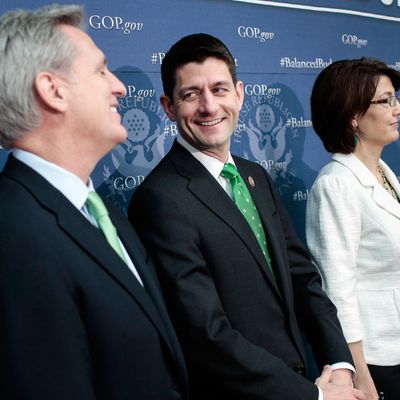
In January, demoralized House Republicans retreated to Williamsburg, Virginia, to plot out their legislative strategy for President Obama’s second term. Conservatives were angry that their leaders had been unable to stop the expiration of the Bush tax cuts on high incomes, and sought assurances from their leaders that no further compromises would be forthcoming. The agreement that followed, which Republicans called “The Williamsburg Accord,” received obsessive coverage in the conservative media but scant attention in the mainstream press. (The phrase “Williamsburg Accord” has appeared once in the Washington Post and not at all in the New York Times.)
But the decision House Republicans made in January has set the party on the course it has followed since. If you want to grasp why Republicans are careening toward a potential federal government shutdown, and possibly toward provoking a sovereign debt crisis after that, you need to understand that this is the inevitable product of a conscious party strategy. Just as Republicans responded to their 2008 defeat by moving farther right, they responded to the 2012 defeat by moving right yet again. Since they had begun from a position of total opposition to the entire Obama agenda, the newer rightward lurch took the form of trying to wrest concessions from Obama by provoking a series of crises.
The first element of the strategy is a kind of legislative strike. Initially, House Republicans decided to boycott all direct negotiations with President Obama, and then subsequently extended that boycott to negotiations with the Democratic Senate. (Senate Democrats have spent months pleading with House Republicans to negotiate with them, to no avail.) This kind of refusal to even enter negotiations is highly unusual. The way to make sense of it is that Republicans have planned since January to force Obama to accede to large chunks of the Republican agenda, without Republicans having to offer any policy concessions of their own.
Republicans have thrashed this way and that throughout the year. Republicans have fallen out, often sharply, over which hostages to ransom, with the most conservative ones favoring a government shutdown threat and the more pragmatic wing, oddly, endorsing a debt default threat. They have also struggled to define the terms of their ransom. The Williamsburg Accord initially envisioned forcing Obama to sign spending cuts, or some form of the Paul Ryan budget. During the summer, Republicans flirted with making Obama lock in lower marginal tax rates. Recently, Republicans settled on pressuring him to kill his health-care law. But the general contours of the legislative strike, and the plan of obtaining policy victories without offering any policy concessions, has enjoyed general agreement within the party.
The history is important because much of the news coverage and centrist commentary has leaned heavily on the idea that the crises in Washington have come about because of some nebulous failure of bipartisanship. The Washington Post editorial page implores both sides to compromise, without explaining why only one party should have to offer policy concessions to keep the government running. Mark Halperin neatly implies that the two sides share the blame in equal measure:
The analytic error here is the assumption by professional pox-on-both-housers that they can take an advocacy position on the government shutdown without siding with one of the parties. If you want to land on the conclusion that both sides are to blame, you need to equivocate on the underlying moral question of whether a shutdown is really a bad thing. If, on the other hand, you want to take a stance against crisis governance, you need to be honest about the fact that one party is pursuing this as a conscious strategy.






























